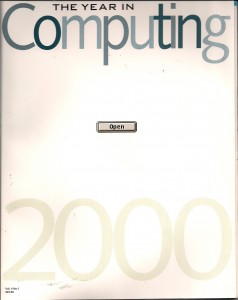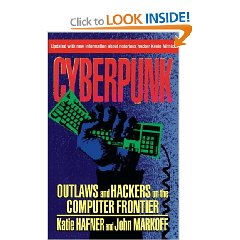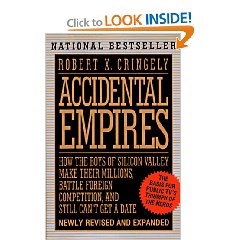Review: Silent Warfare–Understanding the World of Intelligence (Intelligence and National Security Library)
Intelligence (Government/Secret), War & Face of BattleReview: CYBERPUNK–Outlaws and Hackers on the Computer Frontier, Revised
3 Star, Asymmetric, Cyber, Hacking, Odd WarThree case studies are provided, including one dealing with Robert Morris, son of a distinguished NSA scientist and the person who brought America to a standstill with an epidemic electronic virus. By two distinguished journalists who knew little about hackers but could recognize a great story when they saw one, this is one of the more important early books that erroneously labeled hackers as criminals and electronic criminals as hackers.

Review: Accidental Empires–How the Boys of Silicon Valley Make Their Millions, Battle Foreign Competition, and Still Can’t Get a Date
4 Star, Capitalism (Good & Bad), Change & Innovation, Culture, Research, Economics, Information Society, Information TechnologyReview: The Devil’s Garden
5 Star, Corruption, Executive (Partisan Failure, Reform), Threats (Emerging & Perennial), War & Face of BattleReview: Fighting for the Future–Will America Triumph?
5 Star, Asymmetric, Cyber, Hacking, Odd War, Empire, Sorrows, Hubris, Blowback, Force Structure (Military), Insurgency & Revolution, Military & Pentagon PowerRalph Peters draws on over 30 years of experience and at least ten years of published thinking to bring us this capstone book. It is, with Brigadier Simmon's book on RACE TO THE SWIFT, and one or two others (perhaps MajGen Scales book on The Limits of Firepower–can't hit what intel can't find, and anything by Martin Van Crevald), one of the top ten books in military thinking today, and absolutely essential for any officer or any political appointee responsive for national security, to digest and redigest. Ralph speaks truth to power, but power doesn't want to listen. Anyone who has a son or daughter eligible for national service should be reading this book, because the reality is that we are perpetuating a military machine totally unsuited for the conflicts of today and tomorrow, and it is our children who will die because of our silence at voters today.

2000 The Year in Computing Open Source Solutions
About the Idea, Articles & Chapters
The modern Open Source Intelligence (OSINT) revolution began in 1988, and it is known that it takes 25 years to move great ideas toward fruition. Early adopters appeared in 1994-1996, and then a smal second roiund in 2000-2004, after which OSINT was consumed by the bureaucracy (in the USA–in 89 other countries it is doing better). As we enter the final phrase, the operative concept is that governments are the beneficiaries, not the benefcators, of OSINT, and it must therefore be firmly rooted in Public Intelligence as a manifestation of Collective Intelligence, not in the federal budget. Elsewhere we have lectured about “The Future of Intelligence: Not Federal, Not Secret, Not Expensive.” That stands.







